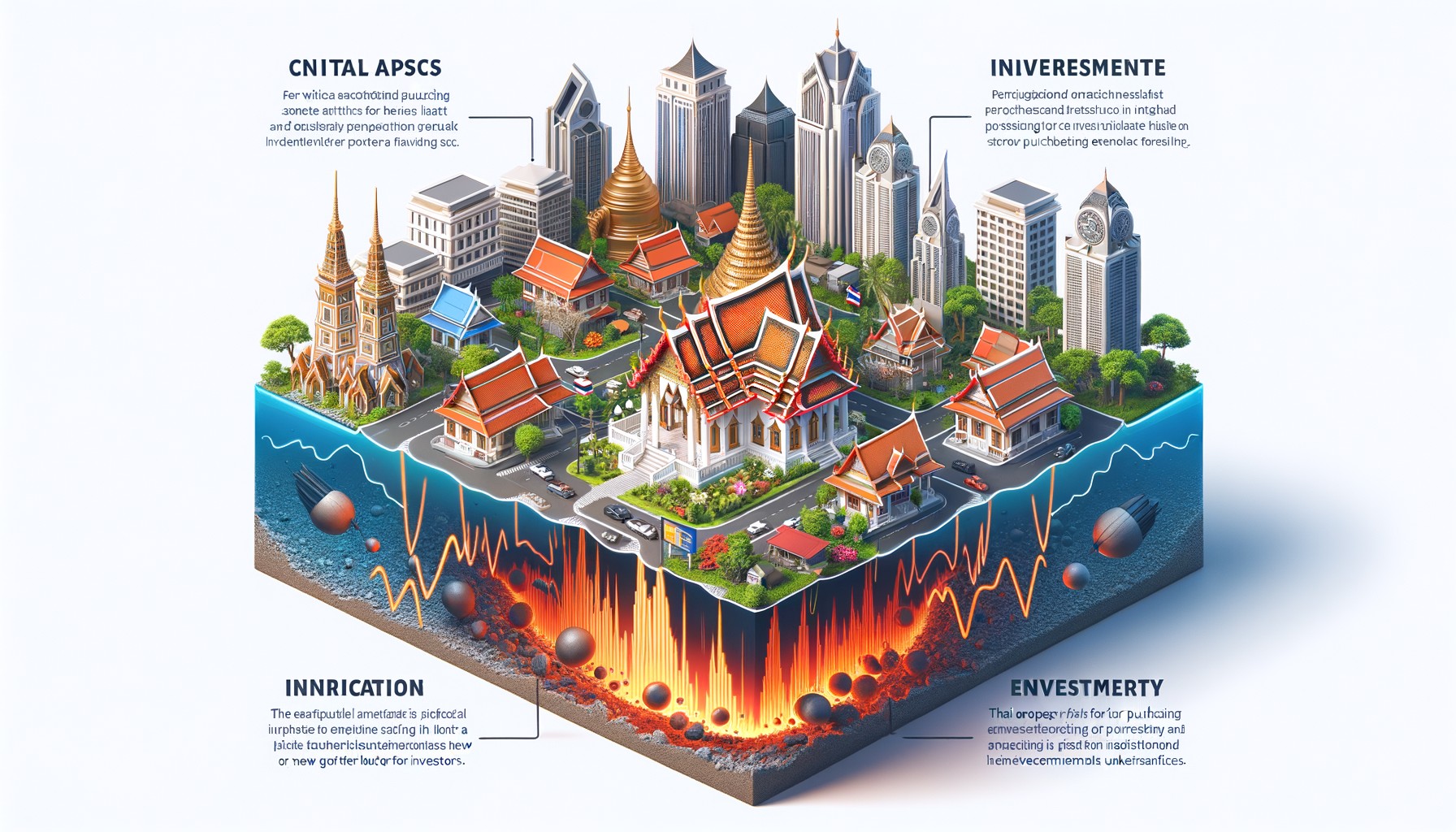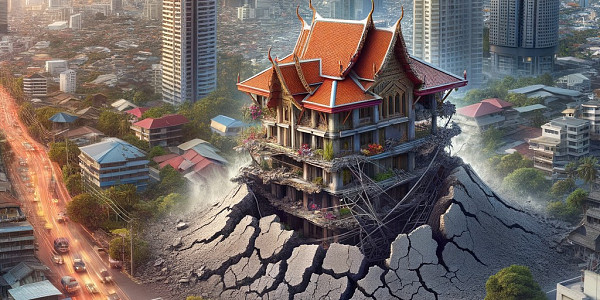
Earthquake in Thailand — how the elements changed the real estate market
The morning of March 28, 2025 forever changed the lives of millions of people in Southeast Asia. A powerful earthquake with a magnitude of 7.3 with an epicenter near the city of Mandalay in Myanmar shook the entire region. The tremors were felt within a radius of more than 1000 km, affecting several countries, but the most dramatic events unfolded in Thailand. The first wave of the earthquake caused serious damage to the capital of Thailand. A 30-story skyscraper under construction collapsed in the city, several bridges collapsed and dozens of historical buildings were damaged. A few minutes later, a powerful aftershock with a magnitude of 6.4 followed, causing further destruction. According to official data, more than 80 people were found under the rubble in Bangkok alone, of whom at least 11 died. However, independent sources report 18 dead and more than 100 missing. The scale of the tragedy is astonishing: the number of victims in Southeast Asia has exceeded a thousand. In addition to human losses, the city suffered colossal material damage. The infrastructure was paralyzed: the metro was closed, the main transport arteries were blocked. Panic began among the population, people hurriedly left high-rise buildings. More than 2,000 city residents reported cracks in their houses, which caused a wave of anxiety and mistrust of developers.
The stock market was one of the first to react to the incident. Shares of the largest Italian-Thai construction company, which was building the collapsed skyscraper, fell by 27%. Trading on the stock exchange had to be urgently suspended to avoid further decline. But the matter was not limited to financial losses. The reputation of the entire industry was at risk. Real estate buyers began talking about the unreliability of modern buildings and the incompetence of developers. People began to demand earthquake resistance examination results en masse, and regulatory authorities tightened requirements for inspection of facilities.
New reality — how buyers' demands have changed
The earthquake did not just damage the infrastructure, it fundamentally changed people's attitudes to choosing housing. If earlier design, location and social environment were priorities, now safety has come to the fore.
- Earthquake resistance as the main criterion — the market demand for apartments in buildings with reinforced foundations, additional load-bearing structures and certified seismic protection systems has sharply increased. Now few are ready to be satisfied with unfounded assurances from developers about the reliability of facilities. Buyers require documentary evidence: calculations, examinations, test results. Moreover, attention is paid not only to new buildings, but also to buildings that have already been commissioned.
- Reputation and reliability of the developer — people want to be sure that they are dealing with a responsible developer who does not save on materials and complies with all safety standards. Surveys show that about 80% of potential apartment buyers are now primarily interested in the history of the developer, its experience in construction in seismically dangerous areas and the transparency of its activities. Companies caught in fraud or neglect of standards are rapidly losing customers.
- Preparedness for emergency situations — chaotic evacuation of people from damaged buildings, lack of a clear action plan, confused and contradictory comments from company representatives have not added confidence to market players. Now, when choosing real estate, buyers pay attention not only to the «peaceful» characteristics of the property, but also to the degree of readiness of the developer to ensure the safety of residents in a crisis situation. The presence of well-established response protocols, a staff of trained specialists, modern warning systems is becoming a serious competitive advantage.
Install our app and get all the tools you need to search for real estate abroad in your smartphone! The mobile application will allow you to quickly access your personal account, manage your favorite properties and track your requests, directly exchange messages with sellers and buyers.

What changes await the market
Changing consumer priorities is just the tip of the iceberg. Experts are sure that the earthquake will trigger a whole chain of transformations that will radically reshape the real estate market in Thailand.
- Revision of building codes — the most obvious consequence is the tightening of building codes and requirements for seismic resistance of buildings. Government regulators have already announced a large-scale revision of current standards, taking into account the sad experience of Bangkok. In particular, it is expected that mandatory seismic certification of new buildings will be introduced, the number and depth of examinations at all stages of construction will increase, and control over the quality of the materials used will be tightened. Additional requirements for the qualifications of design engineers and builders will probably be introduced.
- Market redistribution — another consequence will be the departure of unscrupulous players from the market. Developers who saved on safety for the sake of short-term gain will be forced to either restructure their work or leave the business. At the same time, companies that profess the principles of reliability and customer focus will have a chance to strengthen their positions. The emergence of new strong players is also expected — for example, large international developers with solid experience in construction in earthquake-prone regions. Their expertise and reputation can become a serious support in the fight for the trust of buyers.
- Innovations and technological modernization — finally, changing consumer demands will spur the introduction of innovations and technological modernization of the industry. To meet new safety standards, developers will have to master advanced design and construction methods, invest in research, and more actively use digital solutions. Some experts even predict the emergence of «smart» earthquake-resistant houses in Thailand with automatic building condition monitoring systems, intelligent infrastructure management, and advanced emergency response protocols. And although such a future is still a long way off, the first steps in this direction are expected in the coming years.
In conclusion, I would like to note that the earthquake in Bangkok became a real test for the Thai real estate market. It not only brought destruction and human casualties, but also exposed systemic problems in the construction and development sector. However, every crisis has its downside. Today, Thailand has a historic chance to transform one of the key sectors of the economy, making it safer, more reliable and modern. Obviously, the process will not be easy and will require considerable effort from all market participants. But there is no other way — if the country wants to maintain and increase its investment attractiveness, changes are inevitable. Ultimately, everyone will benefit from them. Buyers will get higher quality and more reliable housing. Developers will be able to strengthen their reputation and reach a new level of development. And the Thai economy will acquire a more stable and diversified foundation. Therefore, despite all the tragedy of the situation, Thailand has every chance to learn valuable lessons from what happened and turn the history of destruction into a history of creation. And if the country manages to take advantage of this opportunity, it will become an even more attractive place to live, work and invest.
 6
6
 25.1
25.1  1
1  1
1  1
1  2
2  5
5
 13
13
 10
10

The devastating earthquake that struck Thailand in March 2025 not only resulted in casualties and large-scale destruction, but also became a turning point for the entire real estate market in the country. Buyers radically revised their priorities when choosing housing, and developers faced new challenges. Our article discusses the impact of the disaster on one of the most dynamic sectors of the Thai economy.

External shocks and internal problems threaten the stability of one of the key sectors of the Thai economy. Developers and professional associations are calling on the government for urgent support measures to avoid recession and maintain housing affordability for the population. Experts suggest tax incentives, attracting foreign investment, developing new clusters and introducing “green” technologies in construction.

Bangkok is experiencing a boom in the serviced apartment market, which attracts investors with high returns and tenants with the convenience of living. Let's look at the features, trends and best projects of this promising segment of real estate in the Thai capital.


























